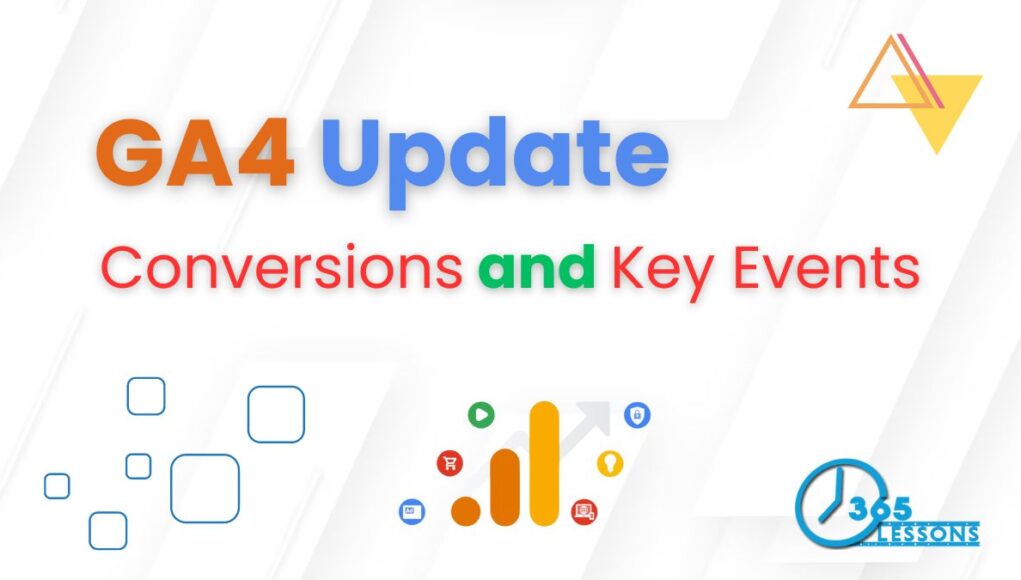Key Events In GA4
In the fast-evolving world of digital marketing, keeping up with trends is a must for businesses that want to optimize their online visibility. A significant update was recently made by Google on Google Analytics 4 (GA4) which changes how conversions and key events are counted and reported across Google Ads and Analytics. The importance of this update is the potential to make performance metrics more accurate and better utilized by stakeholders since it was meant to offer a much simpler, more streamlined experience. Let us look at this update in detail while also addressing its implications and making them simple for all audiences out there.
Table of Contents
Understanding the Update
In the fast-evolving digital landscape, businesses continuously seek ways to enhance the performance of their online advertising campaigns and ensure the best return on investment. Google’s latest update to Google Analytics 4 (GA4) plays a pivotal role in this ongoing quest by refining the approach to measuring and reporting conversions and key events. This section aims to shed light on these changes, explaining the concepts in simple terms for those keen on optimizing their digital strategies.
The Shift in Definitions
Previously, the terms ‘conversions’ and ‘key events’ were often used interchangeably in the context of digital analytics, leading to confusion and inconsistencies in reporting. Google’s update addresses this issue head-on by clearly distinguishing between the two, based on their significance to business success and advertising performance.
- Conversions now exclusively refer to critical actions or engagements that directly relate to the effectiveness of online ad campaigns. These are the actions you want to track meticulously to evaluate how well your advertising efforts are translating into desired outcomes, such as sales, sign-ups, or downloads.
- Key Events, on the other hand, encompass a broader range of interactions that are vital to understanding user behavior and the overall performance of digital channels. These could include website visits, page views, time spent on a site, or specific actions like adding items to a cart. While not all key events directly impact ad performance, they provide valuable insights into the user journey and areas for optimization.
Harmonizing Measurement Across Platforms
One of the primary motivations behind redefining conversions and key events is to harmonize data measurement across Google Ads and Analytics. This alignment is a significant step forward in addressing the discrepancies that have long puzzled marketers and analysts. By having a unified approach, businesses can now benefit from consistent, reliable data that reflects the performance of ad campaigns and user interactions across their digital properties.
This unified data stream not only simplifies reporting but also enhances decision-making. With a clear distinction between conversions and key events, businesses can tailor their strategies more effectively, focusing on optimizing ad spend and improving user engagement in a more targeted manner.
Implications for Digital Strategy
The update’s immediate benefit is the potential for improved accuracy in performance metrics. By understanding the nuances between conversions and key events, businesses can better align their digital marketing strategies with their overall objectives, ensuring that each action taken is informed by data that accurately reflects user behavior and campaign effectiveness.
Moreover, this clarity in definitions aids in setting more precise targets for digital campaigns, improving the allocation of budgets, and refining the user experience based on actionable insights. The emphasis on key events also encourages a more holistic view of the customer journey, highlighting areas outside of direct advertising that can be optimized for better engagement and conversion rates.
In essence, Google’s GA4 update marks a significant step towards more integrated, insightful, and effective digital analytics. By clearly understanding the difference between conversions and key events, businesses are better equipped to navigate the complexities of online marketing, making informed decisions that drive success in a competitive digital landscape.
Key Events in GA4: A Deep Dive
The introduction of “key events” in the latest Google Analytics 4 (GA4) update is a game-changer for businesses focused on understanding and optimizing user behavior on their digital platforms. This section dives deep into the concept of key events, explaining how they can be identified, marked, and utilized to enhance the performance and success of your business.
What Are Key Events?
Key events are interactions or actions on your website or app that are particularly significant for the success of your business. These could range from a user visiting a specific page, engaging with a video, downloading a brochure, to completing a purchase. The common thread among these interactions is their importance in gauging user interest and engagement with your content, products, or services.
The Importance of Key Events
Understanding and tracking key events give businesses a clearer picture of how users interact with their digital platforms. This insight is crucial for several reasons:
- User Experience Optimization: By knowing which events are key to your business, you can tailor the user experience to encourage these actions, leading to higher engagement and satisfaction.
- Marketing Strategy Refinement: Key events provide valuable data that can inform and refine your overall marketing strategy, allowing you to focus your efforts on the channels and campaigns that drive meaningful interactions.
- Performance Evaluation: They enable a more nuanced evaluation of your online presence’s performance, beyond mere page views or session durations, offering a deeper understanding of user behavior.
Identifying and Marking Key Events
The process of identifying and marking key events in Google Analytics is straightforward but requires a thoughtful approach to determine which events are truly key to your business success. Here’s how you can do it:
- Evaluate Your Business Goals: Begin by revisiting your business objectives and goals. Understanding what you aim to achieve online will help pinpoint the interactions that matter most.
- Identify Significant Interactions: Based on your goals, identify the user actions or interactions that are critical indicators of engagement, interest, or conversion. These could vary widely depending on your business model and industry.
- Mark as Key Events in GA4: Once you’ve identified these significant interactions, you can mark them as key events within the Google Analytics interface. This action ensures that these events are tracked prominently, allowing for more detailed analysis and reporting.
Practical Examples
To illustrate, let’s consider two examples:
- E-commerce Website: For an e-commerce business, key events might include users adding items to their cart, initiating a checkout process, or using a coupon code. By marking these actions as key events, the business can closely monitor the effectiveness of its product pages and promotional strategies.
- B2B Service Provider: A B2B company may prioritize key events such as downloading whitepapers, signing up for webinars, or completing a contact form. Tracking these interactions helps the business understand which content and offers are most effective in generating leads.
Leveraging Key Events for Business Success
Once you’ve marked your key events, the next step is to leverage this data to drive business success. Here are a few strategies:
- Optimize User Journeys: Analyze the paths users take to complete key events and identify any obstacles or friction points. Simplifying these paths can lead to higher completion rates.
- Refine Content and Offers: Use key event data to determine which types of content or offers resonate most with your audience, and then refine your strategy accordingly.
- Inform Product Development: Insights from key events can inform product development and improvement, ensuring that you’re always aligning with your users’ needs and preferences.
Conclusion
Key events represent a powerful tool in the arsenal of digital marketers and business analysts, offering deeper insights into user behavior and engagement. By thoughtfully identifying, marking, and leveraging key events, businesses can enhance their online user experience, refine their marketing strategies, and ultimately drive greater success in their digital endeavors.
Conversions: Reimagined
With the latest Google Analytics 4 (GA4) update, the definition of conversions has been refined to streamline the measurement of advertising effectiveness across Google Ads and Analytics. This section delves into the revamped concept of conversions, detailing the process of creating conversions from key events and the pivotal role these conversions play in optimizing your marketing strategies.
A New Definition for Conversions
In the context of the GA4 update, a conversion is now defined as a key event that has been identified as crucial for measuring the performance of your ad campaigns. This redefinition aims to align the measurement of conversions across Google Ads and Analytics, providing a unified and consistent approach to evaluating ad performance. Conversions focus on the actions most directly tied to your advertising objectives, such as sales, lead generation, or specific goal completions.
The Significance of This Change
This shift in defining conversions has significant implications:
- Consistency Across Platforms: By standardizing the definition of conversions, Google has made it easier for businesses to analyze and compare performance metrics across Google Ads and Analytics.
- Improved Accuracy in Reporting: This alignment ensures that the data reported in both platforms is based on the same criteria, leading to more accurate and reliable performance metrics.
- Enhanced Bid Optimization: With a clear understanding of what constitutes a conversion, advertisers can better optimize their bidding strategies to focus on the actions that drive real value for their business.
Creating Conversions from Key Events
Transforming key events into conversions for your Google Ads campaigns is a straightforward process designed to enhance your advertising efficiency. Here’s how you can create conversions from key events:
- Identify Key Events: Start by identifying the key events that are most indicative of successful user interactions or engagements with your digital platforms. These should be actions that directly contribute to achieving your advertising goals.
- Mark Key Events in GA4: Within Google Analytics, mark these identified interactions as key events. This step ensures that these events are tracked and highlighted as significant within your analytics reports.
- Create Conversions in Google Ads: Next, in your Google Ads account, create new conversions based on these marked key events from GA4. This process involves specifying that the key event from Analytics is to be treated as a conversion action in Google Ads.
- Optimize Your Campaigns: With your new conversions set up, you can now use this data to optimize your Google Ads campaigns, focusing your efforts and budget on the actions that are proven to drive meaningful outcomes for your business.
Practical Application
Imagine you run an online learning platform, and one of your key events is when a user signs up for a free trial. By marking this event as a key event in GA4 and then creating a conversion in Google Ads based on this event, you can accurately track how effectively your ad campaigns are driving free trial sign-ups. This information allows you to adjust your ad spend, target your campaigns more precisely, and ultimately increase the return on your advertising investment.
Conclusion
The GA4 update’s redefinition of conversions as key events marked for tracking ad campaign performance represents a significant advancement in digital analytics. By providing a unified framework for measuring conversions across Google Ads and Analytics, businesses can enjoy more accurate, reliable, and actionable data. This clarity enables advertisers to refine their bidding strategies, allocate their budgets more effectively, and drive greater success from their online advertising efforts.
The strategic creation and optimization of conversions from key events will empower businesses to not only track but also enhance the impact of their digital marketing strategies, ensuring that every ad dollar is spent towards achieving tangible business outcomes.
What This Means for Your Business
The Google Analytics 4 (GA4) update, with its revamped definitions of key events and conversions, marks a significant shift in how businesses can track and optimize their digital presence and advertising campaigns. Understanding the practical implications of this update is crucial for businesses aiming to make the most of their online strategies without disrupting existing setups. This section outlines what the GA4 changes mean for your business and how to navigate these updates seamlessly.
Seamless Transition for Existing Setups
One of the primary concerns for businesses following such an update is the potential need for overhauling current analytics and advertising configurations. Fortunately, Google has designed this transition to be as smooth as possible:
- No Immediate Action Required: If you have existing setups in Google Analytics and Google Ads, there’s no immediate need for drastic changes. Key events are designed to be integrated into the current structure, allowing for a seamless transition.
- Continued Reporting and Analysis: Your legacy conversions in Google Analytics will automatically be treated as key events, ensuring continuity in reporting and analysis. This means you can continue to track and evaluate the performance of your digital platforms and campaigns without interruption.
- Future-Focused Adjustments: While existing setups require no immediate changes, Google encourages businesses to start thinking about how future advertising conversions can be based on key events identified in GA4. This proactive approach ensures that your advertising strategies remain aligned with the latest analytics capabilities.
Leveraging New Conversions for Optimized Advertising
With the new definition of conversions, businesses have an opportunity to refine their advertising strategies further:
- Identify Key Events with High Conversion Potential: Evaluate your current key events and identify which ones have the highest potential to drive your advertising goals. This strategic focus ensures you’re optimizing for actions that contribute directly to business success.
- Create Conversions in Google Ads Based on Key Events: Utilize the streamlined process to create new conversions in Google Ads based on these high-potential key events. This approach enhances the alignment between your advertising efforts and the actions that matter most to your business.
- Optimize Bidding Strategies: Armed with more accurate conversion data, refine your bidding strategies to focus on maximizing the outcomes of these key conversions. This targeted approach ensures more efficient use of your advertising budget, driving better results.
Preparing for Future Developments
While the transition may not require immediate action, staying ahead involves preparing for how these changes will shape future advertising and analytics strategies:
- Review and Adjust Key Events Regularly: As your business evolves, so too should your key events. Regularly review these to ensure they remain aligned with your business goals and continue to serve as a basis for meaningful conversions.
- Stay Informed on GA4 Updates: Google continues to evolve its analytics and advertising platforms. Staying informed on updates ensures your business can adapt and take advantage of new features and capabilities.
- Train Your Team: Ensure your marketing and analytics teams are familiar with the GA4 updates. Understanding how to leverage key events and conversions in strategic planning is essential for maximizing the benefits of these changes.
Conclusion
The recent update to Google Analytics 4 (GA4) represent a significant step forward in simplifying and enhancing the way businesses track, report, and analyze user interactions and the performance of advertising campaigns across digital platforms. By redefining conversions and distinguishing them from key events, Google has addressed long-standing discrepancies and confusion in data measurement across Google Ads and Analytics. This alignment ensures a more intuitive, consistent, and actionable framework for businesses aiming to optimize their online presence and advertising strategies.
The introduction of key events as distinct from conversions allows businesses to pinpoint and prioritize the user actions that are most critical to their success. This clarity enables a more focused analysis of user behavior, facilitating the identification of opportunities to improve the user experience and marketing performance. Meanwhile, the streamlined approach to defining and tracking conversions promises more accurate and reliable metrics for evaluating the effectiveness of ad campaigns, enabling advertisers to make more informed decisions about their bidding strategies and budget allocation.
As we navigate these changes, it’s clear that the update is not just a technical adjustment, but a strategic opportunity for businesses to refine their digital analytics and advertising approaches. The distinction between key events and conversions encourages a holistic view of digital interactions, emphasizing the importance of understanding the entire customer journey in driving business success.
For businesses, the key to leveraging this update lies in adapting to the new definitions, re-evaluating their current tracking setups, and embracing the potential for enhanced data-driven decision-making. By doing so, businesses can look forward to not only smoother transitions in their analytics and advertising efforts but also improved outcomes from their digital initiatives.
In the end, Google’s GA4 update is a welcome enhancement for the digital marketing community, offering a more unified, accurate, and efficient way to measure what truly matters in the digital world. As businesses adapt to these changes, the potential for more effective marketing strategies and stronger connections with their audiences is immense. The future of digital analytics and advertising looks brighter, thanks to these thoughtful and user-centric updates from Google.
Frequently Asked Questions (FAQs)
The Google Analytics 4 (GA4) update introduces significant changes to how conversions and key events are measured and reported, which might lead to questions from businesses looking to optimize their use of Google’s platforms. Below are some frequently asked questions that address common concerns and clarifications sought by users navigating the GA4 update.
Why Are Conversions Being Renamed to Key Events?
Google has realigned its terminology to clarify and differentiate the measurement of user interactions that are crucial for business success (key events) from those specifically used to evaluate ad campaign performance (conversions). This change aims to simplify cross-platform measurement between Google Ads and Analytics, ensuring consistency in reporting and facilitating more precise optimization of ad campaigns.
Do Key Events and Conversions Share the Same Attribution Settings?
Yes, the attribution settings applied to what were previously known as conversions now apply to key events. This includes the reporting attribution model and the key event lookback window, which determine how credit for conversions is assigned to different touchpoints in user journeys and how far back in time an interaction can be considered for attribution credit, respectively. This ensures that the performance metrics you rely on remain consistent and actionable under the new definitions.
How Do You Create Google Ads Conversions from Google Analytics Key Events?
To create Google Ads conversions from GA4 key events, you first need to identify and mark key events within Google Analytics that are critical to your advertising goals. Then, in your Google Ads account, you create a new conversion action based on these key events. This process ensures that the conversion data in Google Ads aligns with the key events tracked in Analytics, providing a consistent basis for measuring ad performance.
Can I Use Non-Key Events to Create a Conversion?
Yes, you can use any event tracked in Google Analytics to create a Google Ads conversion. If an event is not initially marked as a key event but is used to create a conversion in Google Ads, it will automatically be marked as a key event. This flexibility allows you to tailor your conversion tracking to include a wide range of user interactions, depending on your specific business and advertising objectives.
How Many Google Ads Conversions Can I Create?
The number of Google Ads conversions you can create based on Google Analytics key events is subject to Google Ads’ configuration limits. However, Google Analytics itself does not impose a limit on the number of key events you can track. This provides considerable flexibility in defining and tracking conversions that are most relevant to your advertising goals.
Does This Change Affect Other Google Advertising Platforms Like Campaign Manager 360 and Display & Video 360?
The update primarily clarifies the terminology and measurement approach within Google Analytics and Google Ads. Conversions in other Google advertising platforms like Campaign Manager 360 and Display & Video 360 are not directly affected by this change. However, the clearer distinction between key events and conversions in GA4 may indirectly benefit users of these platforms by providing more consistent data for cross-platform advertising strategies.
Will My Google Ads Conversions Based on Key Events Get Exported Through BigQuery?
Currently, there is no plan for Google Ads conversions that are based on key events to be exported through BigQuery. The focus of this update is on improving the alignment and consistency of conversion measurement within Google Ads and Analytics platforms. For advanced data analysis and export needs, users should explore other available data integration and export features within Google’s ecosystem.
10 Key Takeaways from the Google Analytics 4 Update
- Unified Measurement Approach: The GA4 update introduces a unified approach to measuring conversions and key events, aiming to eliminate discrepancies between Google Ads and Analytics, ensuring consistency across both platforms.
- Redefinition of Conversions: Conversions are now specifically defined as actions crucial for evaluating ad campaign performance, distinct from other types of user interactions, streamlining the process of tracking advertising effectiveness.
- Introduction of Key Events: Key events measure actions important to a business’s success, providing enhanced insights into user behavior and marketing performance across all channels. This new category enables businesses to focus on broader user interactions beyond ad conversions.
- Seamless Transition: Existing Google Analytics setups will automatically transition, treating legacy conversions as key events, ensuring that businesses can continue their reporting and analysis without interruption.
- No Immediate Action Required for Businesses: The update has been designed to integrate smoothly with existing configurations, meaning businesses do not need to make immediate changes to their current Google Analytics or Google Ads setups.
- Optimization Opportunities: By distinguishing between conversions and key events, businesses have new opportunities to refine their marketing strategies, focusing on optimizing ad spend and improving user engagement in more targeted ways.
- Enhanced Bidding Strategies: The clearer definition of conversions allows for better optimization of Google Ads bidding strategies, focusing efforts on actions that drive tangible business outcomes.
- Flexibility in Event Tracking: Businesses can use any event tracked in Google Analytics to create a Google Ads conversion, providing flexibility in defining what constitutes a conversion based on business-specific goals.
- Consistency and Accuracy in Reporting: The update promises more accurate and reliable performance metrics for ad campaigns, thanks to the consistent tracking of conversions based on key events across Google Ads and Analytics.
- Strategic Advantage: The GA4 update is not merely a technical adjustment but a strategic opportunity for businesses to harness more precise and actionable insights from their digital analytics and advertising efforts. This change encourages a holistic view of digital marketing, emphasizing the importance of understanding the entire customer journey to drive success.








